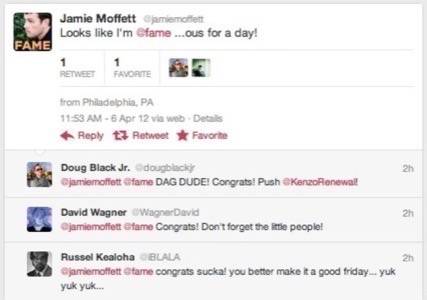Grab a crinkled $5 bill out of the piggy bank and rush to your neighborhood 7-Eleven. Throw it down on the counter, and tell the cashier what kind of lottery ticket you want. In that moment, you’re choosing to ignore the fact that you most likely will be throwing away that Abraham Lincoln. But in the moment of slamming cash down onto the counter, you believe that you can win. All it takes is believing.

Last week, McDonald’s employee Mirlande Wilson of Maryland took that leap of faith. On Monday, she said that she won the state’s Mega Millions Lottery jackpot of $656 million, which amounts to $105 million after taxes. Wilson refused to share the winnings with her coworkers, even though they all allegedly went in on tickets together. In the real world lottery, just like in-person celebritydom, only a few will actually win – and the fame that goes with it isn’t always pretty.
On @fame, you can win the Twitter lottery – or, fame on social media for one day only. In other words, you win followers. Today’s jackpot amounts to 7,446 followers. In the era of social media celebrity – where Twitter is just one of the two most important networking tools one can use, and where people know you by your handle before they know you by name – winning followers may indeed be more valuable and rewarding than those dollar bills.
To play the Twitter lotto, sign up at play-fame.com and connect your Twitter account. Every day at 12 noon EST, Play Fame announces a winner. Like the lotto that we all pay into, all who enter Play Fame participate in the winnings by following the winner’s Twitter account for 24 hours. The next day, when the new winner is announced, the previous winner is unfollowed. So instead of just 15 minutes of fame, the Twitter lotto winner achieves Twitter fame for an entire day.
Take today’s winner, @jamiemoffet. Before today, he only had 17,319 followers. Last I checked, that number had gone up to 23,882 followers. He has been using his temporary Twitter famedom to promote news of his documentary film about trying to change the downtrodden Kensington neighborhood of Philadelphia. Many of the retweets seem to come from other @fame players, congratulating Jamie on his win. Others congratulate him on the news of his film – but the real news of today is that Jamie won @fame.

The world of @fame shifts the meaning of “winning,” equating it with acknowledgement and affirmation by one’s peers rather than monetary gain. It is a different type of celebrity, bringing with it none of the socioeconomic consequences.
In fact, winning the lotto in real life is sometimes the opposite of what the word “achievement” means. With it does not always come the fame, joy, closeness with others and happiness that many who buy a ticket have in mind.
One such story belongs to William Post, a resident of Pennsylvania who won $16.2 million in the state lottery. Shortly after winning, an ex-girlfriend sued him for a portion of the winnings, which she did receive. Post’s brother hired a hit man to try and kill him, in hopes of inheriting the winnings. Other relatives nagged Post for some of the money. BusinessInsider reports that only one year later, he was $1 million in debt and had filed for bankruptcy. His life today includes living on food stamps and a $450 per month stipend.
Monday’s alleged MegaMillions winner Mirlande Wilson did not want to share her winnings with fellow McDonald’s coworkers, who claim that she was one of 15 members in the pool. “We each paid $5,” Suleiman Osman Husein, a shift manager and a member of the pool, tells the NYPost. “She took everybody’s money!”
The clerk at the 7-Eleven where Wilson bought the tickets expressed similar concerns, saying that he isn’t sure if she actually bought the winning ticket. Yesterday she claims to have lost the ticket, also stating that she did not make up the story for attention. She has until September 28 to claim her prize.
On @fame, where the Twitter user is the clear winner, such a controversy couldn’t occur. But then again, the only thing at stake is social media recognition by one’s peers – not cold, hard cash.
















